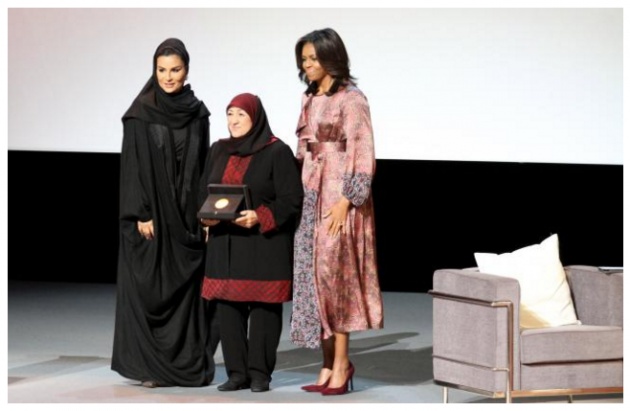
An Afghan woman who supported underground schools at a time when the Taliban banned education for girls, was awarded the fifth annual WISE prize on Wednesday for taking education to marginalised communities.
Sakeena Yacoobi founded the Afghan Institute of Learning (AIL) in 1995, providing schooling and healthcare in Afghan refugee camps in Pakistan as well as setting up the secret home schools, which closed down when Taliban rule ended in 2001.
Since then the charity has expanded its work, helping 12 million people, many of them girls, in rural and marginalised parts of Afghanistan, according to the World Innovation Summit for Education (WISE).
“It is particularly meaningful because this is such a crucial time in Afghanistan,” said Yacoobi, accepting the prize in Doha, Qatar. “I dedicate the prize to the AIL and all of the women, men and children we are educating.”
The Taliban have launched sustained attacks since the withdrawal of most foreign troops late last year, straining the limited resources of Afghan forces. Many districts across the country are now fully or partly under Taliban control.
The $500,000 education prize awarded by WISE, set up by the Qatar Foundation, recognises individuals or teams who successfully address global educational challenges that can bring real change to communities. U.S. First Lady Michelle Obama also spoke at the conference.
“With this prize, we know that we can continue to educate more and more Afghans, giving them hope and encouraging them to go forward no matter what they are facing,” said Yacoobi.
She has also opened private schools under her own name, set up a radio station, and plans to establish a university for women as well as a television network.
Last year the prize was won by Ann Cotton, a British entrepreneur who set up Camfed, the Campaign for Female Education, which has helped educate more than one million girls in Africa.
Other past winners include Vicky Colbert, a Colombian, Madhav Chavan, an Indian, and Fazle Hasan Abed, from Bangladesh. (Reporting By Joseph D’Urso, editing by Tim Pearce. Please credit the Thomson Reuters Foundation, the charitable arm of Thomson Reuters, that covers humanitarian news, women’s rights, trafficking, corruption and climate change. Visit www.trust.org)



